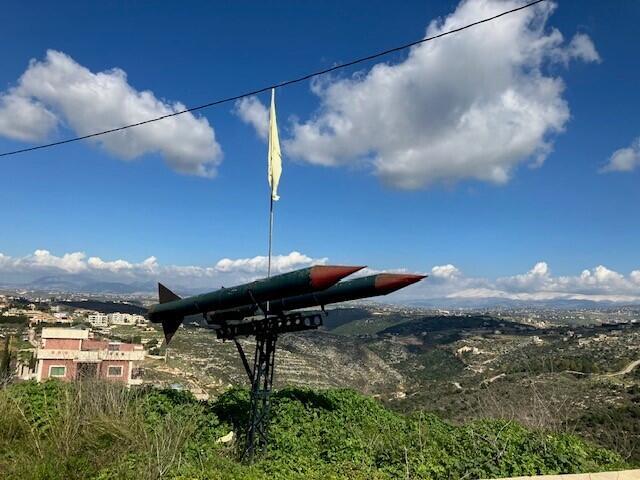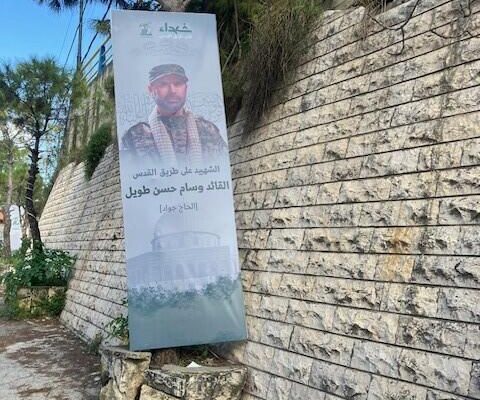In connection with the war in Gaza, clashes are daily between Israel and Lebanese Hezbollah. The political-military organization, close to Iran, carries out rocket and drone attacks which are responded to by Israeli raids. More than 80,000 residents of southern Lebanon have been displaced from the border region. In this Hezbollah stronghold, the Shiite militia is active on the military level, but also on the civil level, in particular by taking charge of the rehousing of displaced families.
5 mins
From our special envoy in southern Lebanon,
The car in front of us stops and through the window one of the passengers points out some blackened debris on the side of the road. It was here that in January a strike attributed to Israel killed Wissam Tawil, a senior commander of the Hezbollah. His portrait is now displayed on banners floating in the streets of the village: the bearded man wears a cap matching his camouflage jacket and the posters make the missing person a “ martyr on the road to Jerusalem “. It is in fact to affirm its solidarity with the Palestinians that Hezbollah attacks northern Israel for four months. “ Yes, he’s a hero. It’s certain », Tells us this resident of the village when we ask her about the death of Wissam Tawil. “ He protected us. Everything that is said about him is not enough to describe this martyr. God knows », she finishes.
A drone crackles in the blue sky. “ Invisible, but Israeli ”, we are told. Here is Khirbet Selm, a Shiite village in the mountains of South Lebanon, only ten kilometers from the Israeli border. For journalists, it is impossible to travel without being authorized and accompanied by members of Hezbollah. They were the ones who told us the location of the strike that cost Wissam Tawil his life, in his native village.
Green fist on yellow background
In these hills, Hezbollah controls everything. The Lebanese army and police are absent from the landscape. Green fist brandishing an automatic rifle on a yellow background, the Hezbollah flag is everywhere. Portraits of Iranian Supreme Leader Ali Khamenei or Revolutionary Guard General Qassem Soleimani, assassinated in 2020, recall the closeness between the Islamic Republic of Iran and Lebanese Hezbollah. The latter is both a political party and a powerful armed organization, whose rockets and drones have targeted northern Israel daily since the start of the war in Gaza.
Here, we will only hear voices favorable to “Hezb” (“the Party”), as the locals call it. “ By the will of God, Israel will cease to exist “, says Hassan who is indignant at “ what Israel is doing to the Lebanese people and the Palestinian people. May Hezb win God willing and we can return to our villages! », he continues. Because Hassan is a displaced person, an agricultural worker from the village of Mhaibi, literally glued to the blue line which serves as the border between Lebanon and Israel. As soon as the region caught fire in October 2023, Hassan fled the area which had become too dangerous. “ If Hezbollah didn’t help us, we wouldn’t have been able to settle down », Explains the fifty-year-old with a weathered face who receives us in the large apartment where he is staying with his wife and their four children. “ They give us a sum of money every month, food aid… Everything we need, we ask for it and they provide it. And there is everything you need: water, electricity, clothes. They even brought furniture for the apartment », he continues.
Read alsoIsrael-Hezbollah: the intelligence war

An important local network
The members of Hezbollah who accompanied us smilingly approved the praise addressed to them. Off-microphone, they explain to us that their movement is ready to face these crisis situations, having a large local network and also the necessary budget. According to them, it was not difficult to find owners of vacant homes to accommodate the displaced, the work consisted of putting them in touch with families in need. The children of the displaced are educated in the host villages, either in public schools or in the Hezbollah network of schools.
Nada Shartoun, 41, her husband and their six children, landed in a splendid residence, after having had to flee their tobacco fields in the border village of Meiss el-Jabal. Nada welcomes us on her new terrace overlooking the green mountains of southern Lebanon. The landscape is majestically beautiful, but on the horizon a thick column of gray smoke reminds us that the region is in a state of war. Nada and her husband were sometimes able to return to their house where they say they discovered remains of white phosphorus, particularly in their cistern. Several NGOs have identified traces of this substance used in certain munitions. In Khirbet Selm, we also meet Ola Sultan whose family insisted, three months before deciding, to leave their village of Talloussah. The forty-year-old confirms that the surroundings of this locality were used for Hezbollah fire towards Israel, leading to responses.
Hassan, a farm worker, tells us that the displaced have received no help from the Lebanese government. In a country plunged for several years into a serious economic and political crisis, Hezbollah wants to show in its strongholds that it can compensate for the shortcomings of a bankrupt state. A message comparable to that which it displays on the military level, by asserting itself as a force defending the interests of Lebanon more efficient than the country’s army.
Read alsoLebanon: in southern Beirut, between fear of war and fatalism
